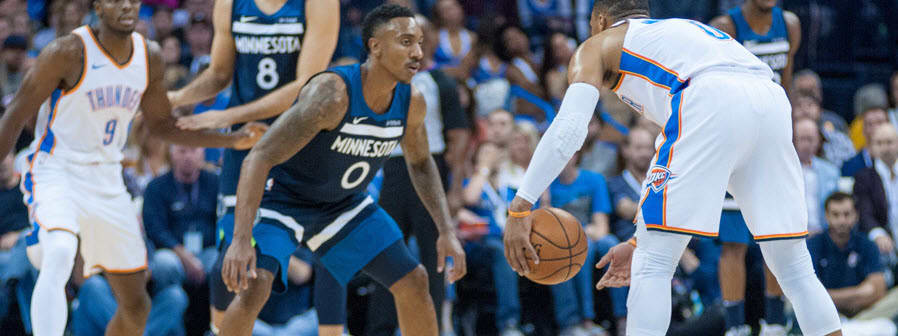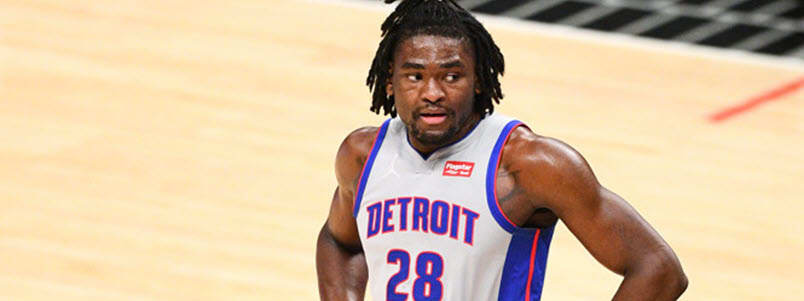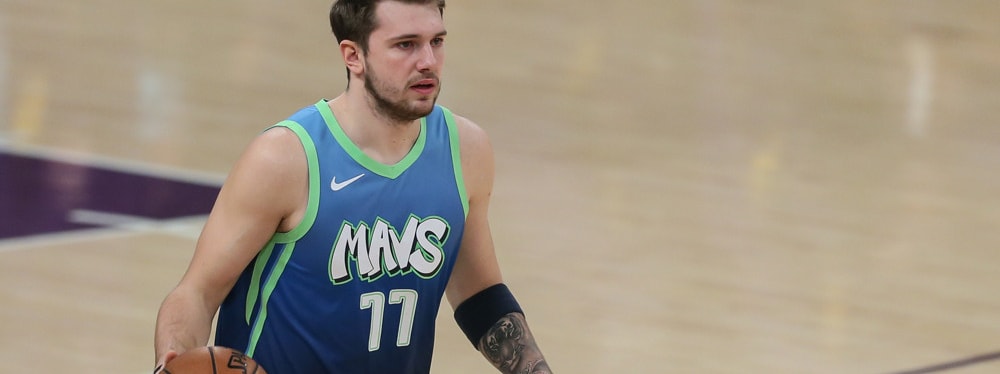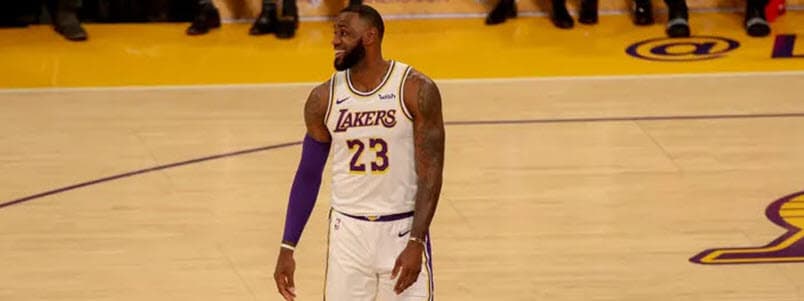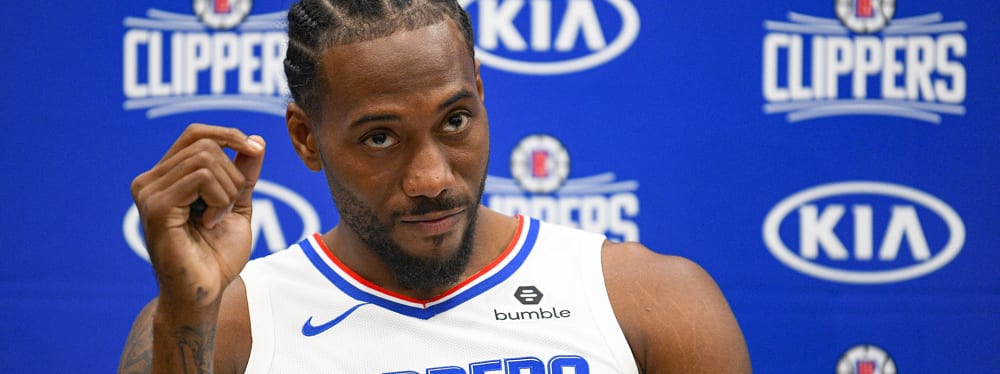Recent RotoWire Articles Featuring Jared Dudley
See More
The 12-year vet agreed to a one-year, $2.6 million contract with the Lakers this offseason after playing a key bench role for the surprisingly successful Nets last season. In 20.7 minutes per tilt, Dudley averaged 4.9 points, 2.6 rebounds and 1.4 assists on 42.3 percent shooting from the floor and 35.1 percent from three-point range. Dudley brings veteran leadership and quality three-point shooting (career 38.4 three-point percentage) to the Lakers -- attributes LeBron James has coveted throughout his career. Dudley figures to serve as the backup power forward to Anthony Davis, where he could see some run with the second unit. Expectations should be tempered, as Dudley has not averaged better than 7.0 points and 3.5 rebounds in the same season since 2015, and in 25 starts for Brooklyn last season, his numbers only marginally improved from his season averages. He'll be a valuable real-life component to the Lakers this season, but he can be ignored in most fantasy formats.
Dudley, due to a persistent illness and several DNP-CDs, appeared in just 64 games last season. He played a significant role for the Suns when he took the floor, however, seeing 21.3 minutes per game and even drawing seven starts. He underwent a procedure on his toe over the summer, so there remains a possibility he won’t be active for training camp or Day 1 of the regular season. The Suns are also in a youthful rebuilding effort, and with 32-year-old Dudley playing positions where the team has depth, his workload from last season is in jeopardy. He’ll be competing against the likes of Josh Jackson, T.J. Warren, Marquese Chriss and Dragan Bender for playing time. Dudley wasn’t the most productive player in his reserve role either, posting 6.8 points, 3.5 rebounds and 1.9 assists per contest. Overall, it seems safe to conclude that his Fantasy value has plateaued, but is likely declining heading into the 2017-18 campaign.
When Kris Humphries failed to develop into a stretch four the Wizards could depend on last season, Dudley was eventually tabbed for those duties in the starting lineup, despite being listed at just 6-foot-7. Dudley made up for his lack of size by providing a much more legitimate threat from downtown, with his 42 percent mark representing his best figure since hitting 45.8 percent of his three-pointers in 2009-10. While Dudley struggled to match up with bigger forwards on the defensive end, he made up for it with his efficient offensive play, finishing the campaign with averages of 7.9 points, 3.5 rebounds, 2.1 assists, 1.2 three-pointers and 0.9 steals in 25.9 minutes per game across 81 appearances. Playing alongside a top-tier point guard in John Wall certainly helped Dudley see more open looks than he had in previous seasons, but he won’t take too much of a hit with the move to Phoenix, where a now-healthy Eric Bledsoe had been playing at an All-Star caliber level before suffering a season-ending meniscus tear last February. In his new locale, Dudley is expected to slide into the starting role at power forward, where he should provide a quality complement to Tyson Chandler, who plays near the rim on both ends of the floor. For at least the early portion of the new season, it’s expected that Dudley’s playing time will be similar to what he received in Washington last season, but his minutes will likely trend downward in the second half as the Suns look to clear room for rookie power forwards Dragan Bender and Marquese Chriss, who were both selected with top-10 picks in June’s draft.
After serving as a veteran presence for the young Bucks in 2014-15, Dudley made his way to Washington to serve a similar role. He often played undersized/stretch power forward for the Bucks, and he may get to reprise that role to some effect as a Wizard. Dudley will also likely be asked to tutor Otto Porter to help get the young forward ready for prime time. For Milwaukee, the 30-year-old averaged 7.2 points, 1.0 three-pointer, 3.1 rebounds, 1.8 assists, 1.0 steals, and 0.2 blocks in 24 minutes. He played in 72 games with 22 starts. Dudley converted 47 percent from the field and 72 percent from the line. He had a memorable game on Dec. 26 in a win over the Hawks in which he hit all 10 of his field goal attempts, including four three-pointers, on his way to a season-high 24 points. Dudley's role with the Bucks was diminished in the second half of the season and he only averaged 18 minutes in the playoff loss to the Bulls. Dudley had surgery on his back in July and was expected to be out for 3-4 months. He may miss the beginning of the season but should be a nice bench player for Washington.
Dudley landed in Milwaukee in late August by way of a trade that sent forward Miroslav Raduljica and spicy swingman Carlos Delfino to the Clippers. While Dudley may seem like an odd pickup for a team in the Bucks' position, he provides veteran leadership and playoff experience to a young core of developing players. Dudley is coming off of a relatively down season with the Clippers in which he appeared in 74 games (starting 43). After three consecutive seasons of double-digit scoring, Dudley's output dropped to 6.9 points per game – his lowest average since the 2008-09 season. The primary reason for the drop-off was a decline in minutes (23 per game), as he saw his playing time dwindle near the end of the season. He was in and out of the lineup throughout the month of April, logging eight DNP-CDs. When the playoffs rolled around, Dudley appeared in just six of Los Angeles' 13 postseason contests, losing minutes to likes of Danny Granger and Darren Collison. Looking for a fresh start with the Bucks, Dudley figures to factor into the lineup at up to three positions. Likely best-suited for the small forward spot, Dudley could also see time at shooting guard and could be used as a stretch-four in certain lineups. A career 40-percent three-point shooter, he'll immediately be one of the Bucks' top threats from beyond the arc.
As has been the refrain for most of his career, Dudley continued to do just about everything well but nothing particularly spectacular with the Suns last season, averaging 10.9 points, 3.1 rebounds, 2.6 assists and 0.9 steals while showing reliability from the field (47 percent) and from three (39 percent). What was perhaps most notable about Dudley's season was a nearly four-minute per game decline in playing time, an especially surprising development considering the Suns lacked any standout wing players. Though it looks as though the Clippers will insert Dudley as their starting small forward, the move to Los Angeles won't necessarily bolster his chances of gathering further playing time, as the Clippers boast arguably the deepest roster in the NBA. Coach Doc Rivers figures to regularly rotate reserves Matt Barnes, Jamal Crawford, Antawn Jamison and Willie Green into action with presumptive wing starters Dudley and J.J. Redick, undermining each player's chances of reaching 30 minutes on a consistent basis. As a result, Dudley's counting stats figure to take a hit, making his fantasy value rooted primarily in his strong shooting marks. With the luxury of working alongside Chris Paul, Dudley could have a chance at approaching the superb 46 percent accuracy from three-point range he displayed in 2009-10 working with another one of the game's better passing point guards in Steve Nash.
Dudley took some small steps forward in his first season as a full-time starter, averaging career highs in points, rebounds, assists and field goal percentage. Dudley seems like the type of player that won’t ever blossom into a star, but he doesn’t have any major red flags in his game. His three-point shooting took a small hit last season, but since he’s shooting 40.9 percent for his career, there’s really not too much reason to complain about the decline. What is worth wondering is the extent to which Dudley’s accomplishments were a product of playing with a pass-first point guard in Steve Nash. With Nash headed to the Lakers this season, new signee Goran Dragic will likely call his own number on offense more often than Nash, but should still get his teammates involved in a similar fashion. While there may be some hiccups in the two players coalescing initially, Dragic and Dudley figure to eventually get comfortable playing alongside each other after the first few weeks of the season. While Dudley isn’t expected to assume a higher scoring load, it wouldn’t be shocking if he posts slight improvement in several categories once again, as it doesn’t appear that he’ll be heavily challenged for playing time.
Dudley was carried in and out of the Suns starting lineup, filling in whenever someone went down with an injury and then selflessly returning to a bench role. With Vince Carter’s contract status up in the air due to the lingering collective bargaining situation in the NBA, it’s anticipated Dudley will claim the starting shooting guard for the Suns this year. Although he played most of his games as Grant Hill’s backup at small forward last season, Dudley was also used as the starting shooting guard in 15 contests. In those games, he averaged 16.3 points, 5.9 rebounds, 2.2 assists, 1.7 three-pointers, 2.1 steals, 0.4 blocks, and 1.2 turnovers in 34 minutes, and did all that while shooting 52 percent from the field and 46 percent from beyond the arc. If he were able to average those same stats across the course of an 82-game season, Dudley would be one of the better small forwards in the fantasy game.
One gets the sense that the Suns acquired Dudley (during the 2008-09 season, along with Jason Richardson) just to test their ability to turn literally anyone into a perimeter threat. Consider: in four years at Boston College, Dudley shot only 36.5 percent from behind the shorter NCAA three-point line. In his first NBA season, with Charlotte, he shot only 9-of-41 on trey balls, and only 12 percent of his total shots were of the three-point variety. Then, in December of 2008, he was sent to Phoenix and immediately became a bomber, hitting three times as many long balls as the season before in only half the time. Last year, he improved even more, hitting 1.5 threes at a 45.8-percent rate. With Grant Hill and Jason Richardson continuing to man the wings, and Josh Childress and Hedo Turkoglu now in the fold, it's unlikely that Dudley surpasses last season's 24 or so minutes. As a result, he's only useful if you're seriously short on threes.
No player enjoyed the Suns' midseason coaching switch more than Dudley. Acquired as a spare part in the Jason Richardson deal, Dudley found himself getting a regular spot in Alvin Gentry's rotation after Amar'e Stoudemire's injury and responded with 8.3 points and 4.0 boards in 20.5 minutes a night through March and April. With Stoudemire back and Earl Clark now around to fight for the same backup minutes at small and power forward, last year's kick to the finish will probably represent a high water mark for Dudley's time in Phoenix.
Dudley’s the type of player that can find a significant role in Brown’s rotation, using his high basketball acumen and penchant for team play at both ends of the floor. He’s not terribly quick, but uses positioning well on defense. He can pass a little, score a little, rebound a little, but will be fighting for limited backup minutes with Adam Morrison behind Gerald Wallace at small forward. He could be a nice reserve on fantasy teams if he’s getting 25 minutes a night, but will need an injury to get that kind of run.
The 22nd pick in the draft, Dudley was an outstanding college player who might be a man without a position in the NBA. Although he's smart and has great instincts, he may be too small (6-7, 225) to play power forward and not quick enough to play small forward. But he's known as a winner and good team player, so he's got value, though it may not be realized this season.
